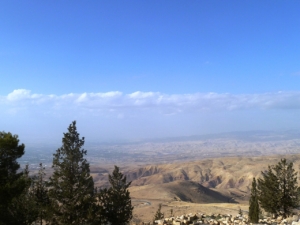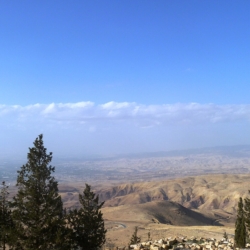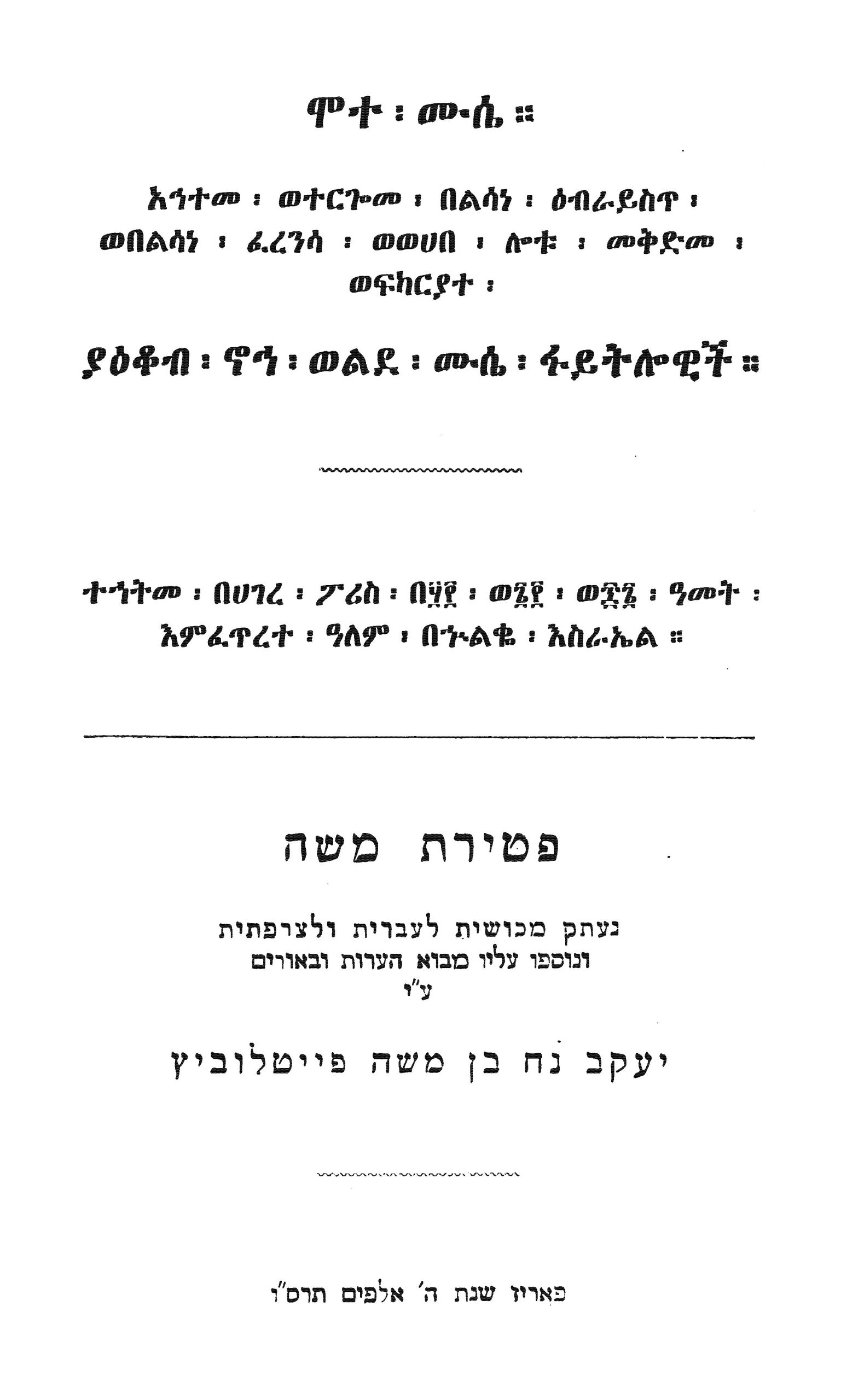There are a LOT more sad piyyuṭim than you would expect for the day of Simḥat Torah, many of which are about the death of Mosheh Rabbeinu. While many of these piyyuṭim are close to lost — at best printed in the very back of a Sukkot maḥzor, and at worst unsaid entirely — considering the traumatic events of Simḥat Torah 5784, perhaps it’s time to bring this custom of communal mourning for Moshe Rabbeinu back around. This pizmon was written by R. Shmuel ben Moshe Ha-Dayan of Aram Ṣoba (ca. 1150-1200) an Aleppine payṭan whose works were almost completely lost before being rediscovered in the Maḥzor Aram Ṣoba. It emphasizes the uneasy juxtaposition of the joy of Simḥat Torah with the tragedy of Moshe’s death. Originally it was probably recited before musaf, but perhaps for those who follow Ashkenazi customs a more appropriate location would be as an introduction to the Yizkor service on Shemini ‘Atseret — which for those who don’t keep second-day yontef is the same day.
TOGGLE COLUMNS (on/off):ADJUST COLUMN POSITIONS: select the column header cell and drag it where you want. show me!COPY INDIVIDUAL COLUMN(S): use CopyTables, a browser extension.
| Source (Hebrew) | Translation (English) |
|---|---|
עַל־מֹשֶׁה אֶרְגָּז וְאָהִים כִּי־לָקַח אֹתוֹ אֱלֹהִים׃ |
Of Moses I am angered and shocked that he was taken by God. |
שַׁׄדַּי הוֹדִיעוֹ בְּחֶפְצוֹ שׁוֹכֵן בִּשְׁחָקָיו וְאַרְצוֹ כִּי־קָרְבוּ יָמָיו וְקִצּוֹ רוּחֲךָ תַּעֲלֶה אֶל־גְּבוֹהִים גַּם תָּשׁוּב אֶל־אֱלֹהִים׃ |
The Concluder[1] This translation for Shaddai is a reference to the midrash that interprets the name as meaning the One who said “that is enough” — she-dai. The idea of God as the one who sets boundaries is quite relevant to this poem about mortality. let him know Their[2] This translation uses the pluralis majestatis to refer to the Divine. This is not meant to imply that God is more than one ḥas v’shalom but rather to reflect the vastness and majesty of God while also avoiding gendered language. See Ibn Ezra’s commentary on Genesis 1:1 for a discussion of the pluralis majestatis when referring to God. wish — The One who dwells in Their welkens and Their earth — that his days were nearing and ending. “Raise Your spirit to on high, also return to God.” |
עַל־מֹשֶׁה אֶרְגָּז וְאָהִים כִּי־לָקַח אֹתוֹ אֱלֹהִים׃ |
Of Moses I am angered and shocked that he was taken by God. |
מֹׄשֶׁה קָרָא אֵין כְּאִישׁ חוֹל אָמוּת וּשְׁכִינָה בְּאֶתְמוֹל שַׁרְתִּי וָאֶשְׁמַע דְבַר קוֹל וָאֶקַּח לוּחוֹת נוֹגְהִים כְּתוּבִים בְּאֶצְבַּע אֱלֹהִים׃ |
Moses called: “Not like a normal person shall I die! Haven’t I previously the Presence beheld, and heard a spoken word, and took the luminous tablets written with the finger of God!?” |
עַל־מֹשֶׁה אֶרְגָּז וְאָהִים כִּי־לָקַח אֹתוֹ אֱלֹהִים׃ |
Of Moses I am angered and shocked that he was taken by God. |
וַׄיֹּֽאמֶר לוֹ צוּר מְרוֹמִים מֵאֶֽרֶץ טֻמְאָה וְדָמִים קוּם וַעֲלֵה לִמְלוֹן תְּמִימִים הַהוֹלְכִים אַחֲרַי וְנוֹהִים וַיֶּחֱזוּ אֶת־הָאֱלֹהִים׃ |
And the Rock on High said to him, “From a land impure and bloody, Get up and ascend to the lodge of the pure ones, Who walk after Me and follow and gaze upon God.” |
עַל־מֹשֶׁה אֶרְגָּז וְאָהִים כִּי־לָקַח אֹתוֹ אֱלֹהִים׃ |
Of Moses I am angered and shocked that he was taken by God. |
אֵׄיךְ אֶעֱזֹב צֹאנְךָ פְּזוֹרוֹת מֵהוֹדִיעָם חֻקִּים וְתוֹרוֹת וַאֲנִי שַׂמְתִּים כִּמְאוֹרוֹת אוֹרָם מִלִּהְיוֹת תְּמֵהִים אֶדַּדֵּם עַד־בֵּית אֱלֹהִים׃ |
“How can I leave my scattered flock From letting them know laws and Torahs? And I set them as luminaries, let their light not be puzzling. I should trek with them to the house of God!” |
עַל־מֹשֶׁה אֶרְגָּז וְאָהִים כִּי־לָקַח אֹתוֹ אֱלֹהִים׃ |
Of Moses I am angered and shocked that he was taken by God. |
לֵׄךְ אַל־תּוֹסֵף עוֹד דְּבָרִים קוּם וַעֲלֵה אֶל־הַר הָעֲבָרִים וּטְמֹן גֹּֽלֶם בַּעֲפָרִים בָּךְ לֶעָתִיד עַם כְּמֵהִים יַגִּֽידוּ פֹּעַל אֱלֹהִים׃ |
“Go, say no more words! Get up and ascend to the Mountain of the Passing Ones, and bury a body in the dust. For you in the future a yearning people will tell of the action of God.” |
עַל־מֹשֶׁה אֶרְגָּז וְאָהִים כִּי־לָקַח אֹתוֹ אֱלֹהִים׃ |
Of Moses I am angered and shocked that he was taken by God. |
צָׄעֲקָה יוֹכֶֽבֶד וְאִשֶּׁה תַּמְרוּר בִּלְבָבָהּ לְמֹשֶׁה בִּכְאִיבָה תֶּחֱרַד וְתֶחֱשֶׁה מַר לָכֶם מֵעַי בְּלוּהִים לָמָּה יִקְצֹף הָאֱלֹהִים׃ |
Jochebed cried, and a bitter fire was in her mind[3] Literally: “heart” — the seat of intellect and thought in Jewish folk practice. for Moses. In pain, she trembled unspeaking. “Bitter for you all, my loins are withered. What angers God?” |
עַל־מֹשֶׁה אֶרְגָּז וְאָהִים כִּי־לָקַח אֹתוֹ אֱלֹהִים׃ |
Of Moses I am angered and shocked that he was taken by God. |
וַׄתֹּֽאמֶר אֶפְקוֹד יְלִידִי אֶל־יָדְךָ הַדָּן יְחִידִי אַתָּה תֵּדַע מָרַת כְּבֵדִי שִׂים מַהֲלָכָיו בֵּין־נְגוֹהִים וּבְתוֹךְ עֵֽדֶן גַּן אֱלֹהִים׃ |
And she said, “I will deposit my child into Your hand, the Only Judge. You know the bitterness of my heart.[4] Literally: “liver” — the seat of emotion and feeling in Jewish folk practice. Place his travails among the luminous ones, and in Eden, the garden of God.” |
עַל־מֹשֶׁה אֶרְגָּז וְאָהִים כִּי־לָקַח אֹתוֹ אֱלֹהִים׃ |
Of Moses I am angered and shocked that he was taken by God. |
בֹּׄא בֶּן־עַמְרָם אֶל־מְחִיצָה לֹא־בָּא־לָהּ עוֹד אִישׁ מְרוּצָה נִלְקַח בִּנְשִׁיקָה וְנִרְצָה מֵעַי הוֹמִים־לוֹ וְרוֹהִים נִגְלוּ אֵלָיו הָאֱלֹהִים׃ |
Amram’s son went to the partition. No other racing man came to him. He was taken with a kiss and was satisfied. My loins shake and tremble for him. Revealed to him was God. |
עַל־מֹשֶׁה אֶרְגָּז וְאָהִים כִּי־לָקַח אֹתוֹ אֱלֹהִים׃ |
Of Moses I am angered and shocked that he was taken by God. |
הַׄיּוֹם יִשְׂרָאֵל יְשִׂימוּן שִׂמְחָה לַתּוֹרָה גַּם יְהִימוּן עַל־מֹשֶׁה וּבְקוֹל יְרִימוּן כֻּלָּם בּוֹכִים הֵם וְנוֹהִים עַל־מֹשֶׁה אִישׁ הָאֱלֹהִים׃ |
Today Israel sets joy for the Torah, and is shocked about Moses, and aloud shouts They all weep and follow after Moses, the man of God. |
Source(s)
Notes
| 1 | This translation for Shaddai is a reference to the midrash that interprets the name as meaning the One who said “that is enough” — she-dai. The idea of God as the one who sets boundaries is quite relevant to this poem about mortality. |
|---|---|
| 2 | This translation uses the pluralis majestatis to refer to the Divine. This is not meant to imply that God is more than one ḥas v’shalom but rather to reflect the vastness and majesty of God while also avoiding gendered language. See Ibn Ezra’s commentary on Genesis 1:1 for a discussion of the pluralis majestatis when referring to God. |
| 3 | Literally: “heart” — the seat of intellect and thought in Jewish folk practice. |
| 4 | Literally: “liver” — the seat of emotion and feeling in Jewish folk practice. |

“עַל־מֹשֶׁה אֶרְגָּז וְאָהִים | Al Mosheh Ergaz v-Ahim — a pizmon on Mosheh’s death for Simḥat Torah, by R. Shmuel ha-Dayan of Aram Ṣoba (ca. 12th c.)” is shared through the Open Siddur Project with a Creative Commons Attribution-ShareAlike 4.0 International copyleft license.











Comments, Corrections, and Queries